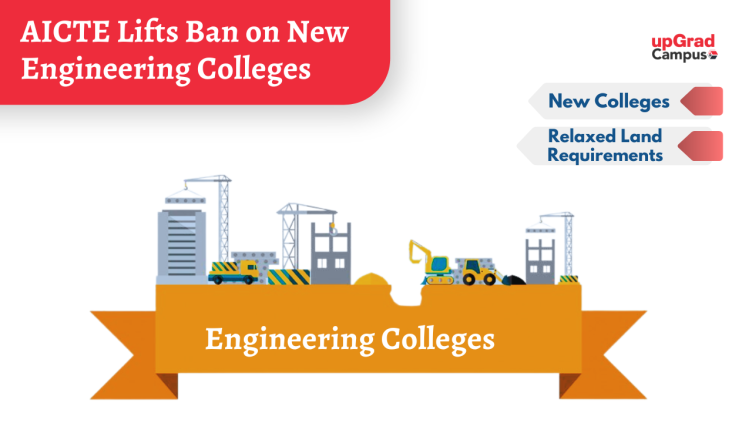AICTE Lifts Ban on New Engineering Colleges & Scraps Minimum Land Requirement
On March 27, 2023
The All India Council for Technical Education (AICTE) has recently lifted the ban on establishing new engineering colleges across the country. The move is expected to boost the engineering education sector and encourage investment in the field. As per the newly approved handbook issued on Thursday, March 23, AICTE has also scrapped the minimum land requirement measures for starting a new college or running an existing one.
The AICTE's approval process handbook for 2023-24 has relaxed the moratorium clauses on establishing engineering and technology institutions in India. As a result, interested non-profit organizations like societies, companies, and trusts can now establish such institutions without any restrictions. This decision by the AICTE is expected to boost core engineering courses like civil, mechanical, electrical, and electronics.
Reasoning Behind Minimum Land Requirement
In 2018, the AICTE constituted a committee, chaired by BVR Mohan Reddy, the chairman of the Indian Institute of Technology (IIT), Hyderabad, to revamp engineering education in the country and recommend prospective plans for the short and medium term. The council had noticed that seats in several engineering colleges were lying vacant, leading to concerns about the quality of education and the employability of graduates.
The AICTE had imposed a moratorium or a suspension on the establishment of new engineering and technology institutions in the country due to concerns over the quality of education and lack of infrastructure. The minimum land requirement was one of the major criteria for setting up an institution, which made it difficult for many organizations to establish new colleges in areas with limited land availability.
According to the previous regulations, institutions were required to have a minimum of two and a half acres of land in urban areas and 10 acres in rural areas to set up a new college. Instead, institutions have been encouraged to go vertical, up to 10 storeys, provided building by-laws in the region allow such construction.
However, AICTE's review of the existing regulations revealed that the minimum land requirement was outdated and did not reflect the changing needs of the sector. Therefore, the council decided to scrap this requirement, making it easier for interested organizations to establish engineering and technology institutions in any building with the required infrastructure and facilities
AICTE's new requirement for engineering course registration
The new candidates looking to start offering engineering courses will now have to register for at least three core engineering courses. This aligns with the National Education Policy (NEP) 2020, which emphasizes the need for multi-disciplinary learning in the fields of Science, Technology, Engineering, and Mathematics (STEM). It has also announced that it will give preference to colleges or institutions that offer courses in multi-disciplinary areas.
In addition, the AICTE has urged institutions to focus on imparting practical skills and hands-on experience to students through internships, industry collaborations, and project-based learning. This will ensure that students are equipped with the necessary skills and knowledge to succeed in the industry and contribute to the country's development.
In conclusion, the AICTE's decision to lift the ban on establishing new engineering colleges and scrap the minimum land requirement is a positive move that is expected to boost the engineering education sector in India. The new regulations are aligned with the National Education Policy (NEP) 2020, emphasizing the need for multi-disciplinary learning in STEM fields and practical skills development.
[Dear readers, if you are part of a Higher Education Institution and looking to upgrade your College/University, you can reach out to us at campus.sales@upgrad.com or just drop us a “Hi” on WhatsApp.]


